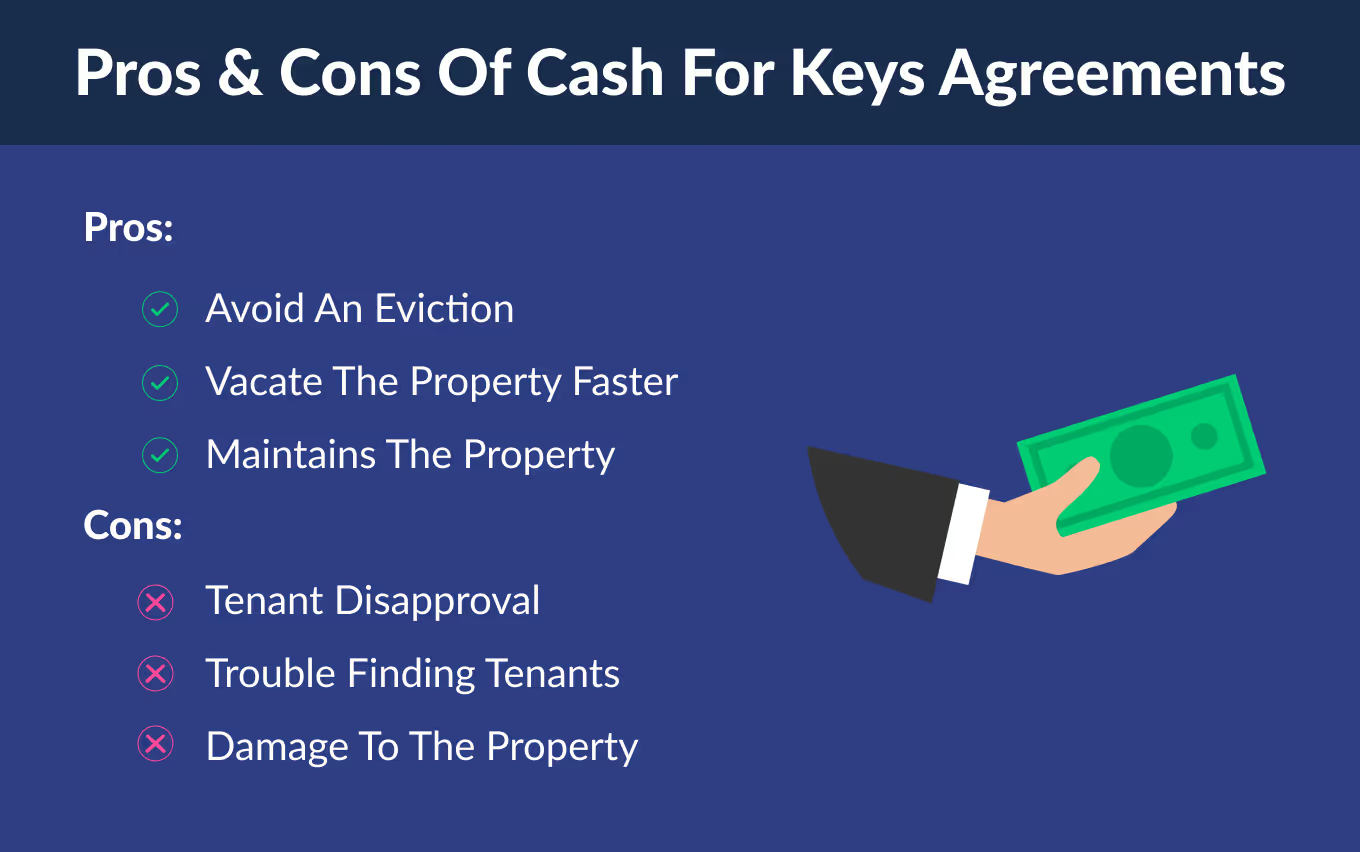As a landlord or property manager, there are many things that can occur that are out of your control.
This could include problems with your tenant, problems with the rental property, or problems with your business in general.
In some of these cases, it may seem like the only way to get your tenant to move out of the rental property is through an eviction process - but that's not true.
In this guide, we will be going explaining what a cash for keys agreement is, as well as its pros and cons and when it is useful.
To begin, let's quickly outline what the agreement is and what it entails.
What Is A Cash For Keys Agreement?
A cash for keys agreement consists property owners paying their tenants to vacate the property peacefully and on time. This is often the most cost-effective and easiest way for landlords to remove tenants from the rental property when needed.
One of the most common cases where a cash for keys agreement is chosen instead of a formal eviction process is when the property is being sold. Then, a landlord offers the tenant a cash payment to vacate the property so that it can be prepared to be sold.
Although this may sound similar to an eviction process, the two couldn't be any more different.
In the next section, we will go over the benefits of resorting to a cash for keys agreement as well as how it is different from an eviction.
Why Use A Cash For Keys Agreement?

There are a few benefits to using a cash for key agreements, but just like with everything else, there are also some drawbacks.
In this section, we will go over both the advantages and disadvantages of pursuing a cash for keys agreement with your tenant.
Advantages of Using A Cash For Keys Agreement
Although it is important to always consider your own situation first, these are some of the general benefits of using a cash for keys agreement with your tenants.
Avoiding An Eviction
One of the main benefits of pursuing a cash for keys agreement is that it will most likely prevent the landlord from having to start an eviction process.
Any landlord who has had to evict a tenant knows how long, complicated, and expensive the process is. Starting from the eviction notice, it can take months to actually get a tenant evicted from a property.
However, with a cash for keys agreement, the tenant can be out of the property by the end of the month. And, on top of that, nobody has to pay any legal fees, court costs, or attorney fees. This can be particularly beneficial to lower-income property owners that cannot pay all of those charges.
Vacate The Property Faster
As previously mentioned, a legal eviction process can be an extremely long process. Luckily, a cash for keys agreement can mean that you get to skip the lengthy eviction process and get the tenant out much faster.
This is especially important if you are planning on making any renovations or upgrades to the rental property. Since you typically can't make any major upgrades to the property while the tenant is still occupying it, it is beneficial to get them out as fast as you can.
Maintain The Condition Of The Property
In some cases, if a tenant is being inconsiderate with the property and you just want them out, a cash for keys process may be better than an eviction. This is typically the case if a landlord wants to sell the property or rent it out to another tenant.
If they see that the property is being maintained well, but the tenant has not explicitly violated the lease agreement, they may form a cash for keys deal and rent the property to someone else.
Disadvantages Of Using A Cash For Keys Agreement
For now, it sounds like a cash for keys agreement is the ultimate problem solver - but that's not true either. Below, we will be explaining some of the drawbacks of using a cash for keys agreement.
The Tenant May Disagree
One of the main points of a cash for keys agreement is that both the landlord and the tenant need to agree. If the tenant does not accept the terms, an eviction process might be your only choice.
There are also cases where the tenant will agree to move out but will still be in the property by the move out date. If this is the case, the cash for keys agreement form is voided and an eviction process will most likely follow.
Trouble Finding Tenants
For those landlords who were able to have the tenants vacate the property very quickly, they may find themselves at a loss when trying to find new tenants. After all, the process of getting a quality tenant, including finding the tenant, accepting their application, sifting through the tenant's credit report, and finalizing the deal, is a very long process.
In these cases, the landlord can suffer lost rent since they are not receiving any more rent payments. So, until they find someone to pay rent and restore their rental income, they are going to be at a financial loss.
Damage To The Property
One of the things that rental property owners hate the most is when their properties get damaged. This is a very common occurrence with tenants that have been offered a cash for keys agreement.
Luckily, if this happens, you still have the tenant's security deposit and can deduct from it any of the damages. However, with accordance with the Fair Housing Laws, you do have to treat this process just like if the tenant were leaving normally.
So, now that you know about all the advantages and disadvantages of pursuing a cash for keys agreement with your tenant, it's time to find out how to do it.
In the next section, we will be going over all of the important steps that need to be taken when forming a cash for keys agreement.
How To Form A Cash For Keys Agreement

Although the process of forming a cash for keys agreement is less complicated than an eviction, there are still many steps to it. Below, we will be explaining all of these steps in detail as well as some important things to note.
Discuss The Situation With The Tenant
Whether the agreement is being brought up because the tenant is being problematic or because of other reasons, it is still important to speak to the tenant.
If it is a problematic tenant, then you may have trouble speaking to them about vacating the property by a certain date. In this case, you want to make sure that you clearly spell out the alternative, which is an eviction.
After outlining the disadvantages of moving on with an eviction, they may be more inclined to accept the cash for keys agreement. And, if they are especially considerate, they will leave voluntarily without any agreement in place.
Extend An Offer
If you are offering cash to the tenant, you're going to want to specify exactly how much the tenant receives. There should also be other things outlined in the agreement, including;
- When the tenant will get paid
- Disclosures about the tenant giving up their right of occupancy for the property
- Any further inspections
- The move out date
- Signatures from both the tenant and the landlord
Conduct A Final Walk Through
Just like with any regular move out, a final walk through it recommended to make sure that the property is being left in good condition. You should have a thorough rental property inspection checklist handy to make sure that you check everything you need to check.
It is vital that you conduct this walk through before you pay tenants because you then run the risk of losing your money.
Make The Exchange
The final step of the agreement is to finally make the exchange. Here, you are receiving the keys from the tenant and you are giving them the cash that was agreed upon.
Many landlords choose to change the locks after this is done to make sure that the tenant does not have access to the property anymore.
Document Everything
For these kinds of agreements, the more documentation, the better.
You want to make sure that every negotiation and interaction has been documented somehow and that there is solid proof of the agreement. Since this can be difficult for verbal agreements, consider getting the agreement in writing.
Bottom Line
Although a cash for keys agreement seems to be very straightforward, there is always space for complications. To be sure about anything you do, you can consult DoorLoop's Laws Page or a local attorney to make sure that you are within your legal right with everything you do.
































.svg)
.svg)

